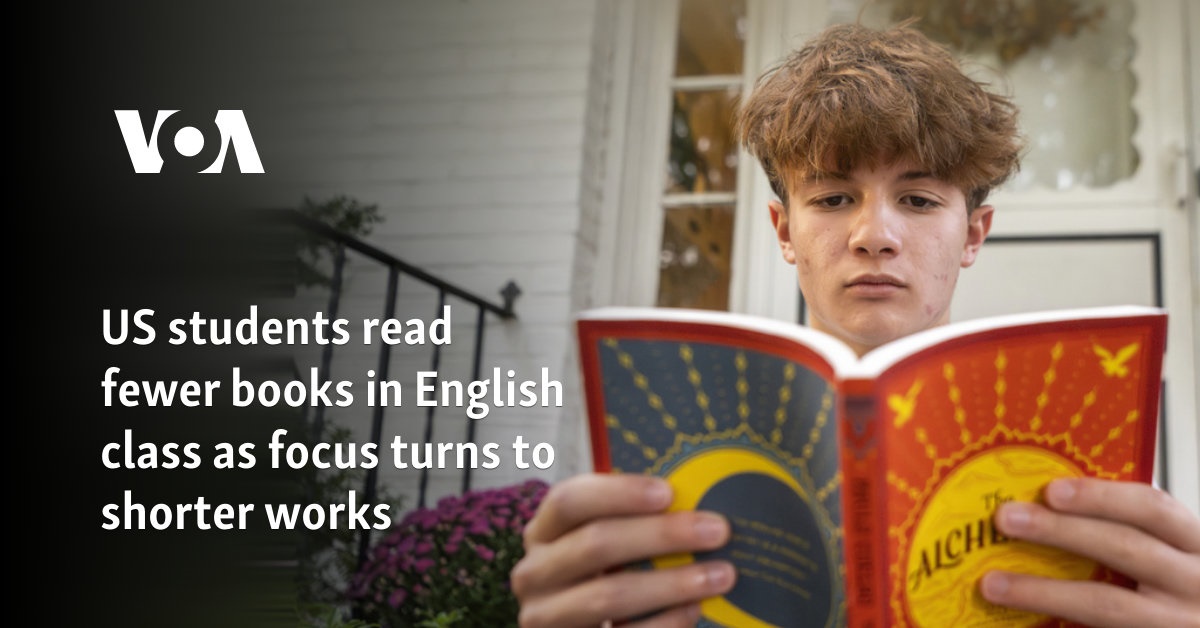
This article was originally published on VOA News - America. You can read the original article HERE

Chris Stanislawski didn't read much in his middle school English classes, but it never felt necessary. Students were given detailed chapter summaries for every novel they discussed, and teachers played audio of the books during class.
Much of the reading material at Garden City Middle School in Long Island was either abridged books, or online texts and printouts, he said.
"When you're given a summary of the book telling you what you're about to read in baby form, it kind of just ruins the whole story for you," said Chris, 14. "Like, what's the point of actually reading?"
In many English classrooms across America, assignments to read full-length novels are becoming less common. Some teachers focus instead on selected passages — a concession to perceptions of shorter attention spans, pressure to prepare for standardized tests and a sense that short-form content will prepare students for the modern, digital world.
The National Council of Teachers of English acknowledged the shift in a 2022 statement on media education, saying: "The time has come to decenter book reading and essay-writing as the pinnacles of English language arts education."
The idea is not to remove books but to teach media literacy and add other texts that feel relevant to students, said Seth French, one of the statement's co-authors. In the English class he taught before becoming a dean last year at Bentonville High School in Arkansas, students engaged with plays, poetry and articles but read just one book together as a class.
"At the end of the day, a lot of our students are not interested in some of these texts that they didn't have a choice in," he said.
The emphasis on shorter, digital texts does not sit well with everyone.
Deep reading is essential to strengthen circuits in the brain tied to critical thinking skills, background knowledge — and, most of all, empathy, said Maryanne Wolf, a cognitive neuroscientist at UCLA specializing in dyslexia research.
"We must give our young an opportunity to understand who others are, not through little snapshots, but through immersion into the lives and thoughts and feelings of others," Wolf said.
At Garden City Middle School, students are required to read several books in their entirety each year, including Of Mice and Men and Romeo and Juliet, Principal Matthew Samuelson said. Audio versions and summaries are provided as extra resources, he said.
Even outside school, students are reading less
There's little data on how many books are assigned by schools. But in general, students are reading less. Federal data from last year shows only 14% of young teens say they read for fun daily, compared with 27% in 2012.
Teachers say the slide has its roots in the COVID-19 crisis.
"There was a trend, it happened when COVID hit, to stop reading full-length novels because students were in trauma; we were in a pandemic. The problem is we haven't quite come back from that," said Kristy Acevedo, who teaches English at a vocational high school in New Bedford, Massachusetts.
This year, she said she won't accept that students are too distracted to read. She plans to teach time-management strategies and to use only paper and pencils for most of class time.
Other teachers say the trend stems from standardized testing and the influence of education technology. Digital platforms can deliver a complete English curriculum, with thousands of short passages aligned to state standards — all without having to assign an actual book.
"If admins and school districts are judged by their test scores, how are they going to improve their test scores? They're going to mirror the test as much as possible," said Karl Ubelhoer, a middle school special education teacher in Tabernacle, New Jersey.
For some students, it's a struggle to read at all. Only around a third of fourth and eighth graders reached reading proficiency in the 2022 National Assessment of Educational Progress, down significantly from 2019.
Leah van Belle, executive director of the Detroit literacy coalition 313Reads, said when her son read Peter Pan in late elementary school, it was too hard for most kids in the class. She laments that Detroit feels like "a book desert." Her son's school doesn't even have a library.
Still, she said it makes sense for English classes to focus on shorter texts.
"As an adult, if I want to learn about a topic and research it, be it personal or professional, I'm using interactive digital text to do that," she said.
Teachers fit books in with other 'spinning plates'
Even in well-resourced schools, one thing is always in short supply: time.
Terri White, a teacher at South Windsor High School in Connecticut, no longer makes her honors ninth-grade English class read all of To Kill a Mockingbird. She assigns about a third of the book and a synopsis of the rest. They have to move on quickly because of pressure for teachers to cram more into the curriculum, she said.
"It's like spinning plates, you know what I mean? Like it's a circus," she said.
She also assigns less homework because kids' schedules are so packed with sports, clubs and other activities.
In the long run, the synopsis approach harms students' critical thinking skills, said Alden Jones, a literature professor at Emerson College in Boston.
"We don't value the thinking time that we used to have. It's all time we could be on our phone accomplishing tasks," she said.
This article was originally published by VOA News - America. We only curate news from sources that align with the core values of our intended conservative audience. If you like the news you read here we encourage you to utilize the original sources for even more great news and opinions you can trust!










Comments